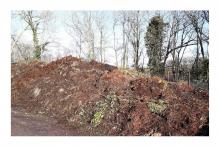Identifying the plant health risks associated with plant waste disposal and peat-free growing media and developing best practice guidance for waste disposal and composting across sectors

This research focussed on two areas of biosecurity that provide significant risk to plant businesses and the wider environment in Scotland, i) plant waste management, and ii) the constituents of reduced-peat and peat-free growing media. Workshops were conducted with stakeholders in plant production (horticulture, agriculture, and forestry), park and garden management and managers of the natural environment, and a review of policy and related literature was performed to increase understanding of current practices and identify barriers to change for these aspects of biosecurity. Diagnostic work was also undertaken to provide evidence of the biosecurity risks posed by Phytophthora spp. in plant waste heaps and constituents of reduced-peat and peat-free growing media. The results indicated that biosecurity risk from plant waste is high, with two quarantine-regulated species, P. ramorum and P. austrocedri being identified. The findings also indicated that a thorough assessment of the potential plant health risks posed by each of the major constituents used in peat-free compost is required.
An evidence-led best practice guidance was produced to provide clear advice on how to achieve a well-managed waste disposal/re-use strategy. Through a targeted programme of knowledge exchange (PHC2023/03) this guidance has been shared with those managing waste in plant nurseries, gardens, parks and other plant handling businesses and is part of the Plant Health Management Standard so that organisations and businesses that are applying to become Plant Healthy Certified can identify what is required to raise their biosecurity standards.
